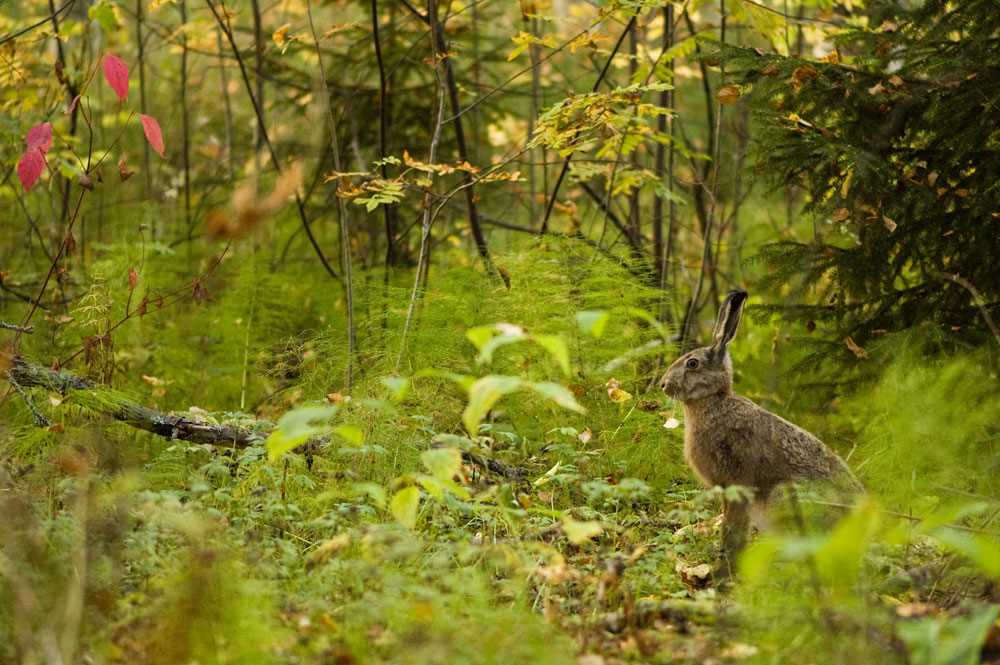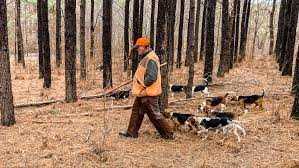Contents
A Comprehensive Guide to Rabbit Hunting in Tennessee: Tips, Best Hunting Locations, and Regulations

Are you an avid hunter looking for a thrilling experience in Tennessee? Look no further than rabbit hunting! The state of Tennessee offers excellent opportunities for hunting these small game animals, with its diverse landscapes and abundant rabbit populations.
Hunting rabbits can be an exciting and rewarding activity for hunters of all skill levels. Whether you’re a beginner or a seasoned pro, the thrill of tracking and flushing out rabbits in Tennessee’s woods and fields is second to none.
Before you embark on your rabbit hunting adventure, it’s important to familiarize yourself with the regulations and guidelines set by the Tennessee Wildlife Resources Agency (TWRA). These regulations ensure the sustainability and conservation of rabbit populations while preserving hunting traditions in the state.
It’s also essential to know the best locations for rabbit hunting in Tennessee. The state offers a variety of habitats where rabbits thrive, including fields, forests, brushy areas, and agricultural lands. Whether you prefer hunting with dogs or stalking rabbits on your own, Tennessee has plenty of spots to suit your hunting style.
Essential Tips for Rabbit Hunting

Rabbit hunting is a popular pastime for many outdoor enthusiasts. Whether you are a seasoned hunter or new to the sport, here are some essential tips to keep in mind when you’re out in the field:
1. Scout your hunting area: Before heading out for a hunt, it’s important to familiarize yourself with the terrain and vegetation of the area you’ll be hunting in. Look for areas with thick cover, such as brush piles and dense shrubs, as rabbits prefer these types of habitats.
2. Use the right equipment: When it comes to rabbit hunting, a shotgun is the preferred weapon of choice. Choose a shotgun with a gauge and choke that is suitable for hunting rabbits. Additionally, make sure to wear appropriate hunting clothing and gear, including blaze orange for safety.
3. Hunt during the right time: Rabbits are most active during dawn and dusk, so plan your hunts around these times for the best chance of success. Be patient and observant, as rabbits can be quick and elusive.
4. Utilize hunting dogs: Hunting with trained rabbit dogs can greatly increase your chances of success. Beagles are commonly used for rabbit hunting due to their excellent scenting ability and agility. Train your dog to track and flush out rabbits for an exciting and efficient hunt.
5. Practice good shooting techniques: Aim for the head or upper body area of the rabbit for a clean and effective kill. Be mindful of your surroundings and avoid taking shots that could endanger others. Always follow proper firearm safety protocols.
6. Be respectful of the environment: Leave the hunting area as you found it and abide by all hunting regulations and restrictions. Respect the land and wildlife, and always prioritize safety.
Rabbit hunting can be a thrilling and rewarding experience. By following these essential tips, you’ll increase your chances of a successful hunt and create lasting memories in the great outdoors.
Selecting the Right Firearm for Rabbit Hunting
When it comes to rabbit hunting in Tennessee, selecting the right firearm is crucial for a successful and ethical hunt. Rabbits are small, fast-moving targets, so choosing a firearm that is appropriate for their size and agility is important.
One popular choice for rabbit hunting is a .22 caliber rifle. This firearm is lightweight, easy to handle, and offers minimal recoil, making it ideal for hunters of all skill levels. The .22 caliber is also effective at close range, which is typically where rabbit hunting takes place.
Another option to consider is a shotgun. Shotguns are versatile firearms that can be used for a variety of game, including rabbits. A 20-gauge shotgun is a common choice for rabbit hunting in Tennessee. This gauge offers a good balance of power and maneuverability and is suitable for shooting rabbits at closer distances.
It is important to note that Tennessee law requires hunters to use non-toxic shot when hunting small game, including rabbits. This regulation is in place to protect wildlife and minimize the impact of lead on the environment. Non-toxic shot, such as steel or bismuth, can be used in both .22 caliber rifles and shotguns, so be sure to select the appropriate ammunition for your chosen firearm.
When selecting a firearm for rabbit hunting, it is also important to consider your own comfort and shooting abilities. Choose a firearm that you are familiar with and can handle confidently. Practice shooting at targets before heading out on your hunt to ensure that you are comfortable and accurate with your chosen firearm.
Remember, safety should always be a top priority when hunting. Familiarize yourself with the regulations and guidelines set forth by the Tennessee Wildlife Resources Agency before heading out on your rabbit hunting adventure. And always remember to handle firearms responsibly and ethically.
So whether you choose a .22 caliber rifle or a shotgun, be sure to select a firearm that is suitable for rabbit hunting in Tennessee. With the right firearm in hand, you’ll be well-prepared for a successful hunt and a memorable outdoor experience.
Choosing the Appropriate Ammunition for Rabbit Hunting
When it comes to rabbit hunting in Tennessee, it is important to choose the appropriate ammunition for a successful and ethical hunt. The right ammunition will ensure that you can effectively take down rabbits while minimizing unnecessary suffering.
First and foremost, hunters should consider the caliber of their ammunition. In Tennessee, .22 caliber rifles are commonly used for rabbit hunting. These rifles provide enough power to quickly and humanely dispatch rabbits, while also offering a good balance of accuracy and maneuverability.
It is essential to select ammunition that is specifically designed for small game hunting. Look for cartridges that are labeled as “varmint” or “small game” rounds. These cartridges are typically lighter and faster, which helps to inflict immediate and lethal damage on rabbits.
Additionally, shot placement plays a crucial role in rabbit hunting. It is important to aim for the head or vital organs to ensure a quick and clean kill. Using ammunition with a hollow point or soft point bullet can help increase the chances of a clean kill by causing maximum damage upon impact.
Lastly, hunters should be aware of the regulations regarding ammunition in Tennessee. It is important to check the state’s hunting regulations to ensure compliance with any restrictions on ammunition type or caliber.
In conclusion, when rabbit hunting in Tennessee, selecting the appropriate ammunition is key to a successful hunt. Choosing the right caliber, using ammunition designed for small game hunting, and considering shot placement will help ensure a humane and effective hunt.
Understanding Rabbit Behavior and Habits
Rabbits are small mammals known for their long ears, fluffy tails, and ability to hop around quickly. They are abundant in Tennessee and can be found in various habitats, including fields, forests, and brushy areas.
Rabbits are most active during the early morning and late evening hours, which is the best time for hunting. They have keen senses of sight, hearing, and smell, making it important for hunters to be quiet and move slowly. The slightest noise or sudden movement can send a rabbit running for cover.
Rabbits are herbivores and primarily feed on grass, clover, and other leafy greens. They have a voracious appetite and can quickly decimate a garden or crop if left unchecked. In Tennessee, where agriculture is a prominent industry, rabbits can sometimes be seen as pests by farmers and landowners.
Rabbits are also known for their reproductive abilities. They have a short gestation period of about 30 days, and a female rabbit, or doe, can have multiple litters in a year. Each litter can consist of 4 to 12 kits, which are born hairless and blind. The kits grow quickly and are able to leave the nest and fend for themselves within a few weeks.
When it comes to habitat, rabbits prefer areas with dense cover, such as thickets, brush piles, or overgrown fields. These provide them with protection from predators, as well as a steady supply of food. Knowing their preferred habitats can greatly increase your chances of finding rabbits when hunting in Tennessee.
Overall, understanding rabbit behavior and habits is essential for a successful hunting trip in Tennessee. By knowing their activity patterns, food preferences, and preferred habitats, you can increase your chances of spotting and harvesting these elusive creatures.
Prime Rabbit Hunting Locations in Tennessee
Tennessee offers a variety of prime locations for rabbit hunting. Whether you prefer hunting on public lands or private grounds, there is something for everyone in the state. Here are some top spots to consider:
- Cherokee National Forest: Located in eastern Tennessee, this vast forest provides ample opportunities for rabbit hunting. Its diverse terrain, including woodlands and open fields, is perfect for both seasoned hunters and beginners.
- Land Between the Lakes National Recreation Area: Situated in western Tennessee, this area spans across both Kentucky and Tennessee. With over 170,000 acres of wooded hills, open fields, and wetlands, it offers excellent rabbit hunting opportunities.
- Chickamauga Wildlife Management Area: This 25,000-acre wildlife management area in southeastern Tennessee provides hunters with a mix of fields, woodlands, and wetlands, making it a prime rabbit hunting location.
- North Cumberland Wildlife Management Area: Located in northeastern Tennessee, this vast area covers over 140,000 acres and offers a variety of habitats for rabbits. It is known for its abundant rabbit population and is popular among hunters.
- Private Hunting Preserves: In addition to public lands, Tennessee has numerous private hunting preserves that allow rabbit hunting. These preserves often offer exclusive hunting experiences and well-managed habitats for rabbits.
When planning a rabbit hunting trip in Tennessee, it’s essential to check the specific regulations and seasons for each location. Make sure to obtain the appropriate licenses and permits required by the Tennessee Wildlife Resources Agency. Always practice safe hunting practices and respect the environment and other hunters.
With its diverse landscapes and plentiful rabbit populations, Tennessee is a prime destination for rabbit hunting. Whether you prefer public lands or private preserves, there are plenty of opportunities to enjoy this exciting hunting activity in the beautiful state of Tennessee.
Cherokee National Forest

The Cherokee National Forest, located in Tennessee, is a prime hunting destination for rabbit enthusiasts. With its vast expanse of wilderness, this forest provides ample opportunities for rabbit hunting.
The forest is home to a variety of rabbit species, including cottontail and swamp rabbits. These rabbits can be found throughout the forest, making it an excellent place for both beginners and experienced hunters.
When planning a hunting trip to the Cherokee National Forest, there are a few regulations to keep in mind. Hunting licenses are required for all hunters, and they can be purchased online or at various retailers throughout the state. It is also important to review the hunting season dates and bag limits, as they may vary depending on the specific rabbit species.
One of the key tips for hunting in this forest is to locate areas with abundant cover, such as thickets, brush piles, and overgrown fields. Rabbits tend to seek shelter in these areas, especially during the colder months. It is also helpful to scout the area beforehand to familiarize yourself with the terrain and potential rabbit habitats.
The Cherokee National Forest offers a unique hunting experience, with its scenic beauty and diverse wildlife. Whether you are a local resident or an out-of-state visitor, this forest is definitely worth exploring for rabbit hunting adventures.
Prentice Cooper State Forest

Prentice Cooper State Forest is located in Tennessee and offers excellent opportunities for rabbit hunting. Covering over 25,000 acres, this forest is abundant in natural resources and wildlife, making it an ideal destination for hunters.
With its diverse terrain and vegetation, Prentice Cooper State Forest provides a variety of hunting environments for rabbit enthusiasts. The forest consists of hardwood ridges, open fields, thickets, and bottomlands, all of which are known to attract rabbits.
Hunting regulations in Prentice Cooper State Forest follow the guidelines set by the Tennessee Wildlife Resources Agency. Hunters are required to have a valid hunting license and follow the established hunting seasons and bag limits. It is crucial to familiarize yourself with these regulations before embarking on a rabbit hunting trip.
When planning your rabbit hunting trip in Prentice Cooper State Forest, it is essential to come well-prepared. Make sure to bring the appropriate hunting gear, including a small game hunting shotgun, blaze orange clothing, and a hunting dog if desired. Additionally, pack essential items such as water, food, navigation tools, and first aid supplies.
While hunting in Prentice Cooper State Forest, be aware of other hunters in the area and practice safe hunting techniques. Always identify your target before taking a shot, and be respectful of the forest and its wildlife.
In conclusion, Prentice Cooper State Forest in Tennessee offers a fantastic rabbit hunting experience. With its expansive land, diverse terrain, and adherence to hunting regulations, this forest provides an ideal setting for hunters to enjoy their sport and immerse themselves in nature.
Natchez Trace State Park

If you’re looking for a picturesque location to go hunting in Tennessee, look no further than Natchez Trace State Park. This stunning park covers over 48,000 acres of diverse landscapes, including rolling hills, hardwood forests, and pristine lakes.
When it comes to hunting, Natchez Trace State Park offers a variety of game species, including rabbits. With its abundance of vegetation and natural cover, the park provides the perfect habitat for rabbits, making it an excellent destination for rabbit hunting enthusiasts.
There are several designated rabbit hunting areas within the park, each offering its own unique challenges and opportunities. Whether you prefer hunting in open fields or wooded areas, you’ll find plenty of options to suit your hunting style. Additionally, the park provides maps and information about hunting seasons and regulations, ensuring a safe and enjoyable hunting experience for all visitors.
Before heading out to Natchez Trace State Park for rabbit hunting, be sure to familiarize yourself with Tennessee’s hunting regulations. These regulations outline important guidelines, such as hunting seasons, bag limits, and licensing requirements. Adhering to these regulations helps ensure the sustainability of the rabbit population and the overall health of the park’s ecosystem.
So, if you’re ready to embark on an exciting rabbit hunting adventure in Tennessee, Natchez Trace State Park is the ideal destination. With its vast and scenic landscapes, along with its abundant rabbit population, this park offers a truly memorable hunting experience.
Regulations for Rabbit Hunting in Tennessee

When it comes to hunting rabbits in Tennessee, there are specific regulations that hunters must follow. These regulations are in place to ensure the safety of both hunters and the rabbit population.
Firstly, hunters must obtain a valid hunting license before they can pursue rabbits. This license can be purchased online or at designated retailers throughout the state. It is important to note that rabbit hunting is only open during specific seasons, so hunters should check the Tennessee Wildlife Resources Agency website for the most up-to-date information.
In Tennessee, there is a daily bag limit for rabbit hunting. Hunters are allowed to harvest a maximum of five rabbits per day. This limit is in place to prevent overhunting and protect the rabbit population from excessive harvesting.
Additionally, rabbit hunting in Tennessee is subject to specific hunting hours. Hunters are only allowed to pursue rabbits from one-half hour before sunrise to one-half hour after sunset. It is crucial to adhere to these designated hunting hours to avoid any legal issues.
Furthermore, hunters should be aware that the use of certain hunting methods and equipment is prohibited for rabbit hunting in Tennessee. This includes the use of bait, artificial lights, and electronic calls. Only traditional hunting methods such as firearms, archery equipment, or hunting with dogs are allowed for rabbit hunting.
Lastly, it is essential for rabbit hunters to understand and follow all general hunting regulations that apply in Tennessee. This includes wearing fluorescent orange clothing for safety purposes, respecting private property boundaries, and reporting harvests as required by the Tennessee Wildlife Resources Agency.
By following these regulations, rabbit hunters can enjoy a safe and responsible hunting experience in Tennessee while helping to preserve the rabbit population for generations to come.
Hunting Season Dates and Bag Limits

In Tennessee, the rabbit hunting season typically begins in late October and runs through February. This allows hunters ample time to pursue rabbits during their prime hunting season.
However, it’s important to note that specific hunting season dates can vary from year to year, so it’s always best to consult the Tennessee Wildlife Resources Agency (TWRA) website or contact your local game warden for the most up-to-date information.
When it comes to bag limits, Tennessee currently allows hunters to harvest a maximum of four rabbits per day. This regulation helps ensure the sustainability of the rabbit population and allows for fair hunting opportunities for all hunters.
| Hunting Season | Bag Limit |
|---|---|
| October – February | 4 rabbits per day |
It’s crucial for hunters to be aware of and abide by bag limits to promote ethical hunting practices and conservation efforts. Additionally, hunters must have the appropriate hunting license and permits, which can be obtained through the TWRA website or at local licensing agents.
By following the hunting season dates and bag limits set forth by the state of Tennessee, hunters can enjoy a rewarding and sustainable rabbit hunting experience while contributing to wildlife conservation efforts.
Required Hunting Licenses and Permits

Before embarking on a rabbit hunting adventure in Tennessee, it’s important to ensure you have the necessary hunting licenses and permits. The Tennessee Wildlife Resources Agency (TWRA) oversees hunting regulations and requires all hunters to obtain a valid hunting license.
There are several types of hunting licenses available in Tennessee, including resident and non-resident options. Residents of Tennessee can obtain an annual hunting license, which allows them to hunt various game animals throughout the year. Non-residents have the option of purchasing a 10-day hunting license or an annual license.
In addition to the hunting license, rabbit hunters in Tennessee are also required to have a small game license. This license specifically permits the hunting of small game animals, such as rabbits, squirrels, and quail. Both residents and non-residents can purchase a small game license.
It’s important to note that certain age restrictions apply when it comes to hunting licenses in Tennessee. Hunters under the age of 13 are not required to have a hunting license, but they must be accompanied by a licensed adult. Young hunters between the ages of 10 and 16 must possess a Junior Hunt/Fish/Trap License, which is available at a reduced cost.
Ensuring you have the proper licenses and permits is essential to staying in compliance with Tennessee’s hunting regulations. Whether you’re a resident or non-resident, obtaining the necessary licenses will allow you to fully enjoy the rabbit hunting opportunities that Tennessee has to offer.
Restricted Areas and Safety Precautions

When rabbit hunting in Tennessee, it’s important to be aware of any restricted areas where hunting is not allowed. These areas can include private property, state parks, and wildlife preserves.
Before venturing out to hunt rabbits, make sure you are familiar with the rules and regulations of the specific area you plan to hunt in. Some areas may require a hunting license or a permit, while others may have specific seasons or bag limits for rabbit hunting.
Additionally, it’s crucial to prioritize safety when engaging in any hunting activity. Always wear appropriate protective gear, including a blaze orange vest or hat to increase visibility among other hunters. Remember to handle firearms safely and be aware of your surroundings at all times.
If you’re hunting with a group, establish a clear communication system and designate a safe zone where hunters should not shoot towards. Be mindful of other hunters in the area and never shoot at unidentified movements or sounds.
Rabbit hunting can be an exciting and rewarding experience, but it’s important to always prioritize safety and respect the rules and regulations in place. By doing so, you can enjoy a successful and responsible hunting trip in the beautiful state of Tennessee.

A skilled hunter, dedicated conservationist, and advocate for ethical practices. Respected in the hunting community, he balances human activity with environmental preservation.

What’s the bag limit for rabbit hunting in Tennessee, and are there any specific gear recommendations for beginners?